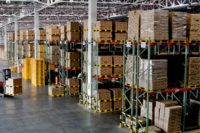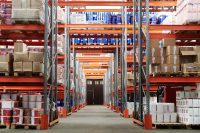The buzz around blockchain makes it sound like a cure-all for the embattled supply chain industry, but supply chain experts have their doubts. In this article we discuss the rise of cryptocurrency, and evaluate blockchain technology in the supply chain.
Understanding Blockchain Technology
If you listen to its advocates in the financial sector, blockchain technology has the potential to drastically improve the effectiveness and profitability of most businesses, with use cases that are especially well-suited to supply chain management.
But does blockchain technology really apply to the supply-chain world? Supply chain executives have a lot of questions, like:
- What is Blockchain in logistics and SCM?
- How do you use Blockchain in supply chain?
- How can blockchain improve supply chain optimization?
- What are the benefits of Blockchain in supply chain management?
At Flowspace, our goal is to provide a clearer understanding of blockchain technology, and to save you the time of assessing its value to your supply chain. So, let’s dive into what blockchain technology is, and whether you can use it to improve the effectiveness and profitability of your supply chain.
What is Blockchain and How Does it Work
Blockchain is a collection of digital information (blocks) stored, bound, and secured (i.e. chained) together in a public database using cryptographic principles. Think of it as a digital ledger book programmed to record not just financial transactions, but almost anything of value.
Though it sounds complicated, the blockchain concept is really quite simple. Rather than store information in a central location, blockchain technology enables an organization to copy and spread digital information across a vast network of computers. Whenever a new block of information is added to the blockchain, every computer on the network updates its blockchain to reflect the change.
Blockchain transactions and ledgers are also encrypted, offering more security than the banking model. Its instantaneous transmission via the internet also eliminates the bank’s two- to three-day clearing process, and the accompanying costs for transferring money from one account to another.
Though blockchain is most commonly associated with cryptocurrency, it can be applied to nearly every business. It has many applications, especially when applied to warehousing, logistics, and supply chain forecasting.
Why is Blockchain Valuable in Supply Chain
Blockchain documents every time a transaction is made, thus creating a permanent history of a product, from manufacture all the way to final sale. This is extremely beneficial to global supply chains, as it dramatically increases efficiency, enables more effective communication with business partners, and simply makes it easier to conduct international business.
Just think of how much faster you could pay your international suppliers if you didn’t have to channel funds through foreign banks. Think about how much easier it would be to ensure health and quality standards if you could rely on an infallible product history. Blockchain makes all of that possible.
How to use Blockchain in Supply Chain
Blockchain technology is already being utilized in supply chains around the globe. It’s also prompted many established IT players and corporations to initiate promising pilot projects, including:
- Walmart – Tested an application that traces pork in China and produces in the US, to authenticate transactions and the accuracy and efficiency of record keeping.
- Maersk and IBM – Working on cross-border, cross-party transactions that use blockchain technology to help improve process efficiency.
- BHP – Introducing a blockchain solution that replaces spreadsheets for tracking samples internally and externally from a range of providers.
As of this writing, these organizations are not aware of any at-scale applications to the supply chain, which raises an essential question: Can blockchain technology add value to supply chains?
How Blockchain Technology Adds Value to Supply Chains
Blockchain technology provides increased supply chain transparency, as well as reduced cost and risk across the supply chain, but also:
- increased traceability of material;
- lower losses from counterfeit/gray market trading;
- improved visibility and compliance over outsourced contract manufacturing;
- reduced paperwork and administrative costs;
- improved credibility and public trust of data shared, and;
- reduced potential of public relations risk from supply chain malpractice
Most importantly, blockchain technology enables all parties within a respective supply chain with access to the same information, potentially reducing communication, or transfer data errors. Less error means less time spent validating data and more time spent on delivering goods and services.
How Can I Use Blockchain and Cryptocurrency to Improve My Supply Chain?
Though Bitcoin and other cryptocurrencies are the earliest application of blockchain technology, its implementation into supply chain positions it as one of the future’s leading technologies that will transform the way businesses operate in years to come.
A number of companies already leverage blockchain technology in adjacent areas. While we salute the power and the promise of blockchain technology, we advise our supply-chain customers to take the time to assess its suitability against less costly options, like Flowspace.
With a presence in every market in the country and the latest technologies at our disposal, Flowspace is uniquely situated to provide our clients with extensive supplier monitoring capabilities. Contact us today to get started.





